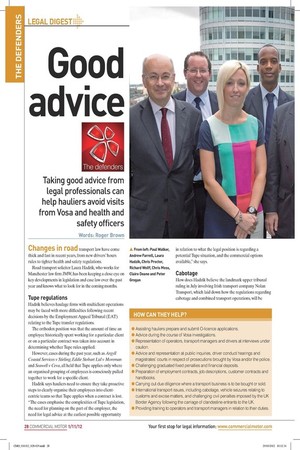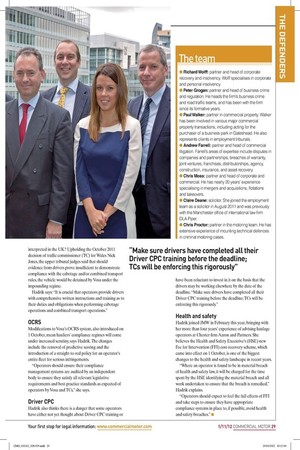Good advice
Page 21

Page 22

If you've noticed an error in this article please click here to report it so we can fix it.
Taking good advice from legal professionals can help hauliers avoid visits from Vosa and health and safety officers
Words: Roger Brown Changes in road transport law have come thick and fast in recent years, from new drivers’ hours rules to tighter health and safety regulations.
Road transport solicitor Laura Hadzik, who works for Manchester law firm JMW, has been keeping a close eye on key developments in legislation and case law over the past year and knows what to look for in the coming months.
Tupe regulations
Hadzik believes haulage firms with multiclient operations may be faced with more difficulties following recent decisions by the Employment Appeal Tribunal (EAT) relating to the Tupe transfer regulations.
The orthodox position was that the amount of time an employee historically spent working for a particular client or on a particular contract was taken into account in determining whether Tupe rules applied.
However, cases during the past year, such as Argyll Coastal Services v Stirling; Eddie Stobart Ltd v Moreman and Seawell v Ceva, all held that Tupe applies only where an organised grouping of employees is consciously pulled together to work for a specific client.
Hadzik says hauliers need to ensure they take proactive steps to clearly organise their employees into clientcentric teams so that Tupe applies when a contract is lost. “The cases emphasise the complexities of Tupe legislation, the need for planning on the part of the employer, the need for legal advice at the earliest possible opportunity in relation to what the legal position is regarding a potential Tupe situation, and the commercial options available,” she says.
Cabotage
How does Hadzik believe the landmark upper tribunal ruling in July involving Irish transport company Nolan Transport, which laid down how the regulations regarding cabotage and combined transport operations, will be interpreted in the UK? Upholding the October 2011 decision of traffic commissioner (TC) for Wales Nick Jones, the upper tribunal judges said that should evidence from drivers prove insufficient to demonstrate compliance with the cabotage and/or combined transport rules, the vehicle would be detained by Vosa under the impounding regime.
Hadzik says: “It is crucial that operators provide drivers with comprehensive written instructions and training as to their duties and obligations when performing cabotage operations and combined transport operations.”
OCRS
Modifications to Vosa’s OCRS system, also introduced on 1 October, mean hauliers’ compliance regimes will come under increased scrutiny, says Hadzik. The changes include the removal of predictive scoring and the introduction of a straight-to-red policy for an operator’s entire fleet for serious infringements.
“Operators should ensure their compliance management systems are audited by an independent body to ensure they satisfy all relevant legislative requirements and best-practice standards as expected of operators by Vosa and TCs,” she says.
Driver CPC
Hadzik also thinks there is a danger that some operators have either not yet thought about Driver CPC training or have been reluctant to invest in it on the basis that the drivers may be working elsewhere by the date of the deadline. “Make sure drivers have completed all their Driver CPC training before the deadline; TCs will be enforcing this rigorously.”
Health and safety
Hadzik joined JMW in February this year, bringing with her more than four years’ experience of advising haulage operators at Chester firm Aaron and Partners. She believes the Health and Safety Executive’s (HSE) new Fee for Intervention (FFI) cost-recovery scheme, which came into effect on 1 October, is one of the biggest changes to the health and safety landscape in recent years.
“Where an operator is found to be in material breach of health and safety law, it will be charged for the time spent by the HSE identifying the material breach and all work undertaken to ensure that the breach is remedied,” Hadzik explains.
“Operators should expect to feel the full effects of FFI and take steps to ensure they have appropriate compliance systems in place to, if possible, avoid health and safety breaches.” ■
HOW CAN THEY HELP?
• Assisting hauliers prepare and submit O-licence applications.
• Advice during the course of Vosa investigations.
• Representation of operators, transport managers and drivers at interviews under caution.
• Advice and representation at public inquiries, driver conduct hearings and magistrates’ courts in respect of prosecutions brought by Vosa and/or the police.
• Challenging graduated fixed penalties and financial deposits.
• Preparation of employment contracts, job descriptions, customer contracts and handbooks.
• Carrying out due diligence where a transport business is to be bought or sold.
• International transport issues, including cabotage, vehicle seizures relating to customs and excise matters, and challenging civil penalties imposed by the UK Border Agency following the carriage of clandestine entrants to the UK.
• Providing training to operators and transport managers in relation to their duties.
The team
• Richard Wolff: partner and head of corporate recovery and insolvency. Wolff specialises in corporate and personal insolvency.
• Peter Grogan: partner and head of business crime and regulation. He heads the firm’s business crime and road traffic teams, and has been with the firm since its formative years.
• Paul Walker: partner in commercial property. Walker has been involved in various major commercial property transactions, including acting for the purchaser of a business park in Gateshead. He also represents clients in employment tribunals.
• Andrew Farrell: partner and head of commercial litigation. Farrell’s areas of expertise include disputes in companies and partnerships, breaches of warranty, joint ventures, franchises, distributorships, agency, construction, insurance, and asset recovery.
• Chris Moss: partner and head of corporate and commercial. He has nearly 20 years’ experience specialising in mergers and acquisitions, flotations and takeovers.
• Claire Deane: solicitor. She joined the employment team as a solicitor in August 2011 and was previously with the Manchester office of international law firm DLA Piper.
• Chris Proctor: partner in the motoring team. He has extensive experience of mounting technical defences in criminal motoring cases.











































